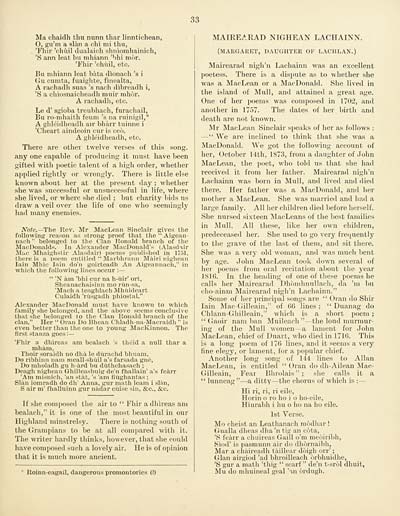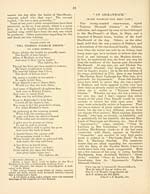Download files
Complete book:
Individual page:
Thumbnail gallery: Grid view | List view

33
Ma chaidh thu nunn thar linntichean,
0, gu'm a slàn a chi mi thu,
'Fliir 'ehiiil dualaich shniomhainich,
'S ann leat bu nihiann 'bhi mòr.
'Fhir 'chùil, etc.
Bu mhiann leat bàta dìonach 's i
Gu cunita, fuaighte, finealta,
A rachadh suas 's nach dibrcadh i,
'S a chiosnaicheadh muir mhòr.
A rachadh, etc.
Le d' sgioba treubhach, furacliail,
Bu ro-mhaith feuni 's na ruinigil,*
A ghleidheadh air bharr tuinne i
'Cheart aindeoin cur is ceo.
A ghleidheadh, etc.
There are other twelve verses of this song,
any one capable of producing it must have been
gifted witli poetic talent of a high order, whether
applied riglitly or wrongly. There is little else
known about her at the present day ; wiiether
siie was successful or unsuccessful in life, where
siie lived, or where she died ; but charity bids us
draw a veil over the life of one who seemingly
had many enemies.
A'^o^e.— The Rev. Mr MacLean Sinclair gives the
following reason as strong proof that the"Aigean-
nach " belonged to the Clan Ronald branch of the
MacDonalds. In Alexander MacDonald's (Alasdair
Mac Mhaighstir Alasdair) poems published in 1751,
there is a poem entitled "Ma rbhrann Màiri nighean
Iain Mhic Iain do'n goirteadh An Aigeannach," in
which the following lines occur :—
" 'N am 'bhi cur na h-ùir' ort,
Sheanachaisinn mo rùn-sa,
'Mach a teaghlach Mhùideart
Culaidh 'rùsgadh phiostal."
Alexander MacDonald must have known to which
family she belonged, and the above seems conclusive
that she belonged to the Clan Ronald branch of the
clan." Her " Oran Do Bhean Chladh-na-Macraidh " is
even better than the one to young MacKinnon. The
first stanza goes :—
'Fhir a dhireas am bealach 's theid a null thar a
mhàm,
Thoir soraidh no dhà le dùrachd bhuam.
Do ribhinii nam meall-shiiil a's farsada gnè.
Do mholadh gu h-àrd bu dùthchasach ;
Deagh nighean Ghilleasbuig de'n fhallain' a's feàrr
'Am misnich. 'an stàt, 's 'am fìùghantas ;
Slàn iomradh do dh' Anna, gur math learn i slàn,
S air m' fhalluinn gur nàdar cùise sin, &c., &c.
If she composed the air to " Fhir a dhireas am
bealach," it is one of the most beautiful in our
Highland minstrelsy. There is nothing south of
the Grampians to be at all compared with it.
The writer hardly thinks, however, that she could
have composed such a lovely air. He is of opinion
that it is much more ancient.
" Roinn-eagail, dangerous promontories (?)
MAIREARAD NIGHEAN LACHAINN.
(MARGARET, DAUGHTER OF LACHLAN.)
Mairearad nigh'n Lachainn was an excellent
poetess. There is a dispute as to whether she
was a MacLean or a MacDonald. She lived in
the island of Mull, and attained a great age.
One of her poems was composed in 1702, and
another in 1757. The dates of her birth and
death are not known.
Mr MacLean Sinclair speaks of her as follows :
— " We are inclined to think that she was a
MacDonald. We got the following account of
her, October 14th, 1S73, from a daughter of Joiin
MacLean, the poet, who told us tliat she had
received it from her father. Mairearad nigh'n
Laciiainn was born in Mull, and lived and died
there. Her father was a MacDonald, and Iter
motlier a MacLean. She was married and had a
large family. All her children died before herself.
She nursed sixteen MacLeans of the best families
in Mull. All tiiese, like her own children,
predeceased her. She used to go very frequently
to the grave of the last of them, and sit there.
She was a very old woiiian, and was much bent
by age. John MacLean took down several of
her poems from oral recitation about the year
1816. In the heading of one of these poems he
calls her Mairearad Dhòmhnullach, da 'm bu
cho-ainm Mairearad nigh'n Lachainn."
Some of her principal sono's are " Oran do Shir
Iain Mac-Gilleain," of 66 lines ; " Duanag do
Chlann-Ghilleain," which is a short poem ;
" Gaoir nam ban Muileach" — the loud murmur-
ing of the Mull women — a lament for John
MacLean, chief of Duart, who died in 1716. This
is a long poem of 176 lines, and it seems a very
fine elegy, or lament, for a popular chief.
Another long song of 144 lines to Allan
MacLean, is entitled " Oran do dh-Ailean Mac-
Gilleain, Fear Bhrolais"; she calls it a
" lunneag" — a ditty — the chorus of which is : —
Hi ri, ri, ri eile,
Horin o ro ho i o ho-eile,
Hiurabh i hu o ho na ho eile.
1st Verse.
Mo cheist an Leathanach mòdhar !
Gualla dheas dha 'n tig an còta,
'S feàrr a chuireas Gaill o'm meùiribh,
Sìod' is pasmunn air do dhòrnaibh.
Mar a chàireadh tàillear dòigh orr' ;
Glan airgiod 'ad bhroilleach òrbhuidhe,
'S gur a math 'thig " scarf" de'n t-sròl dhuit,
Mu do nihuineal geal 'an òrdugh.
Ma chaidh thu nunn thar linntichean,
0, gu'm a slàn a chi mi thu,
'Fliir 'ehiiil dualaich shniomhainich,
'S ann leat bu nihiann 'bhi mòr.
'Fhir 'chùil, etc.
Bu mhiann leat bàta dìonach 's i
Gu cunita, fuaighte, finealta,
A rachadh suas 's nach dibrcadh i,
'S a chiosnaicheadh muir mhòr.
A rachadh, etc.
Le d' sgioba treubhach, furacliail,
Bu ro-mhaith feuni 's na ruinigil,*
A ghleidheadh air bharr tuinne i
'Cheart aindeoin cur is ceo.
A ghleidheadh, etc.
There are other twelve verses of this song,
any one capable of producing it must have been
gifted witli poetic talent of a high order, whether
applied riglitly or wrongly. There is little else
known about her at the present day ; wiiether
siie was successful or unsuccessful in life, where
siie lived, or where she died ; but charity bids us
draw a veil over the life of one who seemingly
had many enemies.
A'^o^e.— The Rev. Mr MacLean Sinclair gives the
following reason as strong proof that the"Aigean-
nach " belonged to the Clan Ronald branch of the
MacDonalds. In Alexander MacDonald's (Alasdair
Mac Mhaighstir Alasdair) poems published in 1751,
there is a poem entitled "Ma rbhrann Màiri nighean
Iain Mhic Iain do'n goirteadh An Aigeannach," in
which the following lines occur :—
" 'N am 'bhi cur na h-ùir' ort,
Sheanachaisinn mo rùn-sa,
'Mach a teaghlach Mhùideart
Culaidh 'rùsgadh phiostal."
Alexander MacDonald must have known to which
family she belonged, and the above seems conclusive
that she belonged to the Clan Ronald branch of the
clan." Her " Oran Do Bhean Chladh-na-Macraidh " is
even better than the one to young MacKinnon. The
first stanza goes :—
'Fhir a dhireas am bealach 's theid a null thar a
mhàm,
Thoir soraidh no dhà le dùrachd bhuam.
Do ribhinii nam meall-shiiil a's farsada gnè.
Do mholadh gu h-àrd bu dùthchasach ;
Deagh nighean Ghilleasbuig de'n fhallain' a's feàrr
'Am misnich. 'an stàt, 's 'am fìùghantas ;
Slàn iomradh do dh' Anna, gur math learn i slàn,
S air m' fhalluinn gur nàdar cùise sin, &c., &c.
If she composed the air to " Fhir a dhireas am
bealach," it is one of the most beautiful in our
Highland minstrelsy. There is nothing south of
the Grampians to be at all compared with it.
The writer hardly thinks, however, that she could
have composed such a lovely air. He is of opinion
that it is much more ancient.
" Roinn-eagail, dangerous promontories (?)
MAIREARAD NIGHEAN LACHAINN.
(MARGARET, DAUGHTER OF LACHLAN.)
Mairearad nigh'n Lachainn was an excellent
poetess. There is a dispute as to whether she
was a MacLean or a MacDonald. She lived in
the island of Mull, and attained a great age.
One of her poems was composed in 1702, and
another in 1757. The dates of her birth and
death are not known.
Mr MacLean Sinclair speaks of her as follows :
— " We are inclined to think that she was a
MacDonald. We got the following account of
her, October 14th, 1S73, from a daughter of Joiin
MacLean, the poet, who told us tliat she had
received it from her father. Mairearad nigh'n
Laciiainn was born in Mull, and lived and died
there. Her father was a MacDonald, and Iter
motlier a MacLean. She was married and had a
large family. All her children died before herself.
She nursed sixteen MacLeans of the best families
in Mull. All tiiese, like her own children,
predeceased her. She used to go very frequently
to the grave of the last of them, and sit there.
She was a very old woiiian, and was much bent
by age. John MacLean took down several of
her poems from oral recitation about the year
1816. In the heading of one of these poems he
calls her Mairearad Dhòmhnullach, da 'm bu
cho-ainm Mairearad nigh'n Lachainn."
Some of her principal sono's are " Oran do Shir
Iain Mac-Gilleain," of 66 lines ; " Duanag do
Chlann-Ghilleain," which is a short poem ;
" Gaoir nam ban Muileach" — the loud murmur-
ing of the Mull women — a lament for John
MacLean, chief of Duart, who died in 1716. This
is a long poem of 176 lines, and it seems a very
fine elegy, or lament, for a popular chief.
Another long song of 144 lines to Allan
MacLean, is entitled " Oran do dh-Ailean Mac-
Gilleain, Fear Bhrolais"; she calls it a
" lunneag" — a ditty — the chorus of which is : —
Hi ri, ri, ri eile,
Horin o ro ho i o ho-eile,
Hiurabh i hu o ho na ho eile.
1st Verse.
Mo cheist an Leathanach mòdhar !
Gualla dheas dha 'n tig an còta,
'S feàrr a chuireas Gaill o'm meùiribh,
Sìod' is pasmunn air do dhòrnaibh.
Mar a chàireadh tàillear dòigh orr' ;
Glan airgiod 'ad bhroilleach òrbhuidhe,
'S gur a math 'thig " scarf" de'n t-sròl dhuit,
Mu do nihuineal geal 'an òrdugh.
Set display mode to: Large image | Transcription
Images and transcriptions on this page, including medium image downloads, may be used under the Creative Commons Attribution 4.0 International Licence unless otherwise stated. ![]()
| Early Gaelic Book Collections > Ossian Collection > Macdonald bards from mediaeval times > (43) |
|---|
| Permanent URL | https://digital.nls.uk/80460917 |
|---|
| Description | Selected books from the Ossian Collection of 327 volumes, originally assembled by J. Norman Methven of Perth. Different editions and translations of James MacPherson's epic poem 'Ossian', some with a map of the 'Kingdom of Connor'. Also secondary material relating to Ossianic poetry and the Ossian controversy. |
|---|
| Description | Selected items from five 'Special and Named Printed Collections'. Includes books in Gaelic and other Celtic languages, works about the Gaels, their languages, literature, culture and history. |
|---|

